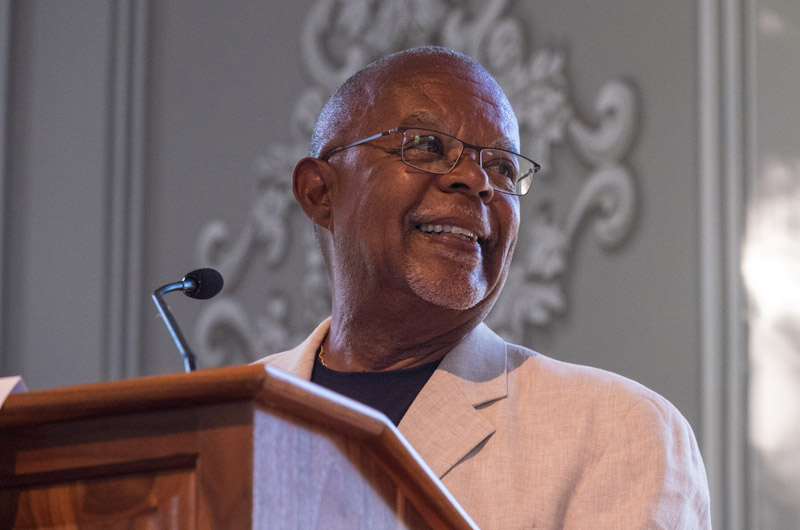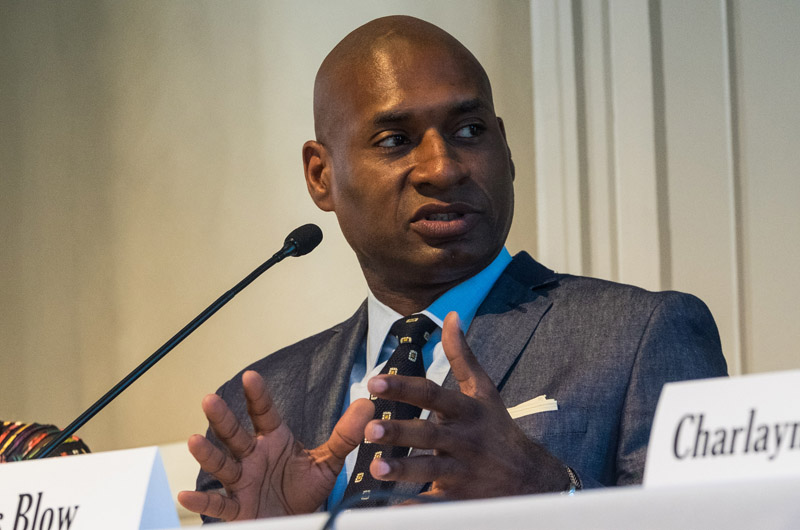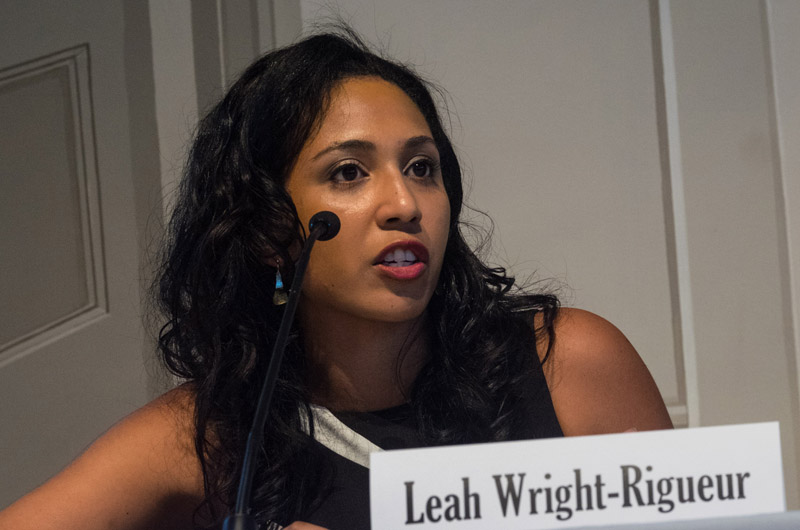The Republican party, Donald Trump and the media all came under fire in this year’s Hutchins Forum, in the midst of what will surely be remembered as one of the most consequential presidential elections in modern time.

As sunlight dappled the walls of the Old Whaling Church in Edgartown last Thursday evening, a four-member panel of leading media voices held little back during the discussion titled Race and The Race to the White House. The annual event is hosted by the Hutchins Center for African and African American Research at Harvard University.
“The topic is on all of our minds,” Henry Louis (Skip) Gates Jr., director of the Hutchins Center, said in opening remarks. “Not only because of the blistering and bruising diatribes of one particular candidate, but also, on the other hand, by the soaring rhetoric of our first lady and our president at the most recent Democratic National Convention.”
Panelists included Donna Brazile, a longtime CNN contributor and interim chairman of the Democratic National Committee, the conservative radio host Armstrong Williams, Leah Wright Rigeur, an assistant professor of public policy at Harvard, and New York Times columnist Charles Blow. Lawrence D. Bobo, chairman of the department of African and African American Studies at Harvard, offered closing remarks. Journalist and Oak Bluffs resident Charlayne Hunter-Gault moderated the panel.

Mr. Gates echoed comments by Michelle Obama at the convention drawing attention to the importance of having a black family in the White House, but also looked ahead to the coming years.
“How can we come to understand what drives the bitter anti-black racism that still divides us and even motivates some of our elected?” he said. “And then how can we work together to eliminate this racism? We have a long road ahead of us in this investigation.”
Race has always played a role in presidential elections, said Ms. Brazile. But she said the level of hostility toward people of color sets this election apart.
Looking ahead, she said she hoped to maintain a network of progressive leaders in all 50 states, and to see a woman in the White House come January.
Armstrong Williams provided much fodder for debate. While he agreed that the Republican party had taken a turn for the worse, he stood firmly behind Mr. Trump as the party nominee and argued that Democratic nominee Hillary Clinton was perhaps no better.
“People are angry,” he said, noting the deep racial tension in cities like Ferguson and Birmingham, and an electorate that can’t relate to the political system. “It’s only a matter of time before your city is on fire, and all we can talk about is the most flawed presidential candidates in the history of presidential politics running for office.”
Panelists agreed that Mr. Trump should reach out to black voters, although some suggested it may be too late, given his track record of offensive remarks while on the campaign trail and an apparent lack of policy proposals.
Ms. Rigeur, author of The Loneliness of the Black Republican: Pragmatic Politics and the Pursuit of Power, said she saw Mr. Trump as a symptom of a much larger problem within the party.
“This is a point in time when African Americans, when black voters essentially say farewell to the party of Lincoln for what amounts to forever,” she said, noting that many studies have shown Mr. Trump’s support to be driven by racism. “We have to see what’s underneath that racism,” she said. “It’s incredibly important to think about that.”
Discussion focused mostly on Mr. Trump, a wealthy businessman and former television personality, although Mrs. Clinton drew some heat as well. Mr. Blow noted the ramifications of the controversial crime bill that Mrs. Clinton supported in the 1990s, and what he called a “legitimate gripe” among young people of color who blame politicians who supported the bill for greatly limiting their upward mobility.
The discussion echoed last year’s forum, which focused on the role of black millennials in the struggle for civil rights; and the one two years ago, which explored Barack Obama’s presidency in the context of race. All the panelists but Ms. Rigeur had participated in 2014.
On the subject of millennials, Ms. Brazile noted how former candidate Bernie Sanders had won over young voters. “The reason why Bernie caught that wave was because Bernie addressed these issues head on: income inequality, student debt,” she said. “[Young people] don’t think Donald Trump will fight for them. But Hillary has a chance of speaking to their issues and their needs.”
Mr. Williams lamented what he called Mr. Trump’s volatility and lack of leadership at times, but said he hoped the Republican nominee would eventually come around.
“If Donald Trump were just to be normal . . . this would be a different race,” he said. But his suggestion that Mr. Trump reach out to students at a historically black college drew laughter from the audience. Mr. Blow, who attended Grambling State University in Louisiana, agreed the idea would never fly. “I believe that there is legitimate hostility to him,” Mr. Blow said. “I think that people feel that he is an affront to everything that is right and good about America.” It was one of many comments throughout the evening that drew applause and cheering.
Ms. Rigeur dismissed arguments that Democrats tend to focus only on rhetoric and symbolism. “The Democratic party always comes to the table with policies,” she said. “They may not be the greatest policies, they may not be the most effective policies . . . But they have something.”
The conversation soon turned to the media, with panelists sharply criticizing an industry they said has cared more about ratings than balanced coverage during the campaign. Ms. Brazile estimated that Mr. Trump has received close to $5 billion in so-called free earned media.

“Ladies and gentlemen, God bless Donald Trump,” she said. “But 82 days from now, I hope we can finally say, ‘Goodbye. You’re fired.’”
Not everyone agreed that Mr. Trump didn’t deserve his widespread media coverage. “He was the front dog from the beginning,” Mr. Williams said, noting the candidate’s dominance over a wide and well-funded Republican field. “Nobody in this room thought Donald Trump would be the nominee,” he added. “But because he became the nominee, that will be the story of this presidential election season.”
Mr. Blow disagreed. “I’m calling a hustle a hustle,” he said.
A large number of questions and comments from the audience explored issues including the political and social backlash that often follows moments of progress; and the apparent contradiction of Republicans who call out Mr. Trump’s remarks as racist and yet stand behind him as the party nominee.
In his closing remarks, Mr. Bobo noted a long history of racially coded messages in the political process, calling Mr. Trump “the absolute, final reaping of what the Republican party has been sowing for more than 40 years.” And he agreed with Mr. Williams that “if the guy were just normal, he’d be at least even with Hillary in the polls right now. This is what ought to scare you all.”
But he also called out the panel for mirroring the very media they criticized.
“Eighty per cent of our dialogue is about Donald Trump,” he said. “That’s his power to dominate the scene and the stage. But it’s also part of the failing of the Democrats — that in a room where we would have talked about issues of concern to black America, about voters who are anxious, we can’t easily call up the message on the other side.”
Picking up on the theme of race and the Obama presidency, Mr. Bobo noted the wall of opposition the president has faced over the last eight years, but also what he saw as notable progress in the area of civil rights. As one example, he pointed to the recent Department of Justice reports on policing in Ferguson, Philadelphia and Baltimore, as having created a foundation for further action.
And he remained somewhat darkly optimistic that Mr. Trump’s campaign under the new leadership of Breitbart News chairman Stephen K. Bannon would “triple down on idiocy,” ensuring a Democratic win in November.
“We are going to survive this moment,” Mr. Bobo said.










Comments (4)
Comments
Comment policy »